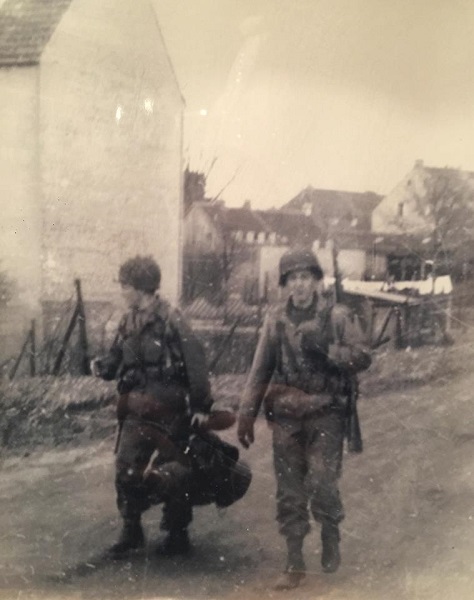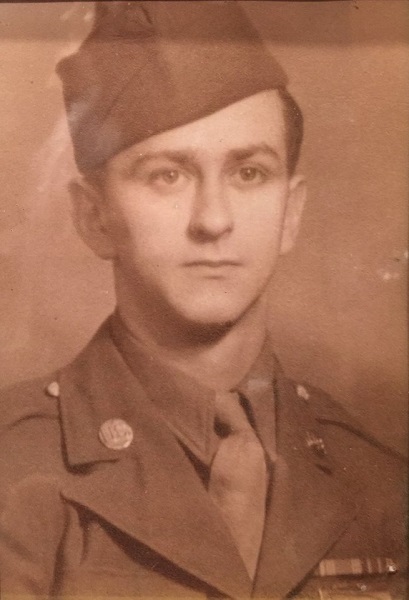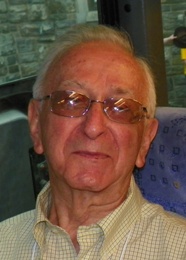When he was drafted in 1943 at the age of 18, Kochan didn’t think the Army was for him. He was hoping he could join the Navy, but he was told it was filled up. So into the Army he went and soon joined the most hazardous part of it, the infantry. First he was sent to Fort Dix, then basic training at Fort McClellan in Alabama. He became a rifleman in the 83rd Infantry Division of F Company, Gen. George Patton’s Third Army.
In the last week of June, a little more than two weeks after D-Day, Chet Kochan and fellow soldiers landed at Omaha Beach at Normandy as replacement troops. He made his way to the west, first through Saint-Lô, a town virtually leveled by the American assault, and then farther west to Saint-Malo about 90 miles from the Normandy beaches. That was in early August. Kochan was shot on August 11, 1944.
"We were fighting street to street, door to door" Kochan said. "We captured two Germans we just surprised on the street." Kochan and about 10 of his fellow soldiers were set to take on a German anti aircraft gun. "We rushed it," he said. "Guns were firing at us and we were hit with hand grenades." That’s when he was shot. The bullet entered at the base of his neck in front and exited the neck at the back. As the 19-year old Army Private Chester Kochan lay bleeding from a gunshot wound he never blacked out and he never lost his sense of humor. “The medic looked at me and said, 'you have two holes in your neck', "I told him he better bandage the bigger hole." "I was lucky, it didn’t hit a vein or any other vital part," he said. He was patched up as best as possible and, because he had nowhere else to go, continued to move forward, this time through a tunnel toward the big gun.
"At the end of the tunnel the Germans were there." He said. "We were captured. One German asked me, 'Why are you fighting us?'" Kochan and his fellow prisoners found themselves blindfolded by the Germans. "I thought they were going to kill us," he said. But instead of being shot or even taken prisoner of war, "we were sent to an American field hospital." The Germans and the Americans had somehow worked out a deal to trade wounded soldiers. "I was in the hospital for three months. I still have shrapnel in me," he said. He did not return to the front, instead he was assigned to be a driver for fellow soldiers.
Chester "Chet" Kochan spilled his blood on France soil, earning the Bronze Star and two Purple Hearts.
In 1946 he was honorably discharged from the Army as a private first class. "My captain, Capt. (Robert) Mitchell, had wanted to make me an assistant squad leader and offered to promote me to corporal," he said. "I didn’t want that."

Chester "Chet" Kochan on the right somewhere in France |
 |
After the war he worked for Singer Manufacturing in Elizabeth, then became quality control specialist at Picatinny Arsenal in Rockaway Township until he retired. The trouble is, he didn’t really retire. At age 86 he still did quality control work for Norton Systems in Norwalk Conn., and also for Lockheed-Martin in New York City.
In recent years France has been looking for American veterans who fought in France from D-Day onwards. On May 8, 2012, Chet Kochan joined 39 other World War II veterans for a special ceremony at the U.S. Military Academy at West Point, N.Y. Kochan and his fellow soldiers were awarded the French government’s Legion d’Honneur, the French Legion of Honor award, for his service in France during the war.


